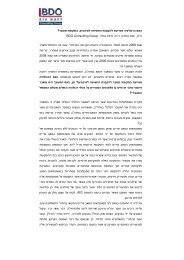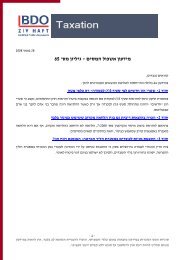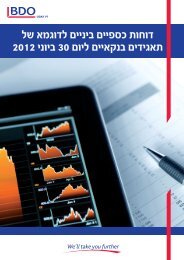preface
preface
preface
You also want an ePaper? Increase the reach of your titles
YUMPU automatically turns print PDFs into web optimized ePapers that Google loves.
16<br />
ISRAEL – GENERAL OVERVIEW<br />
Israel has an electoral system based on nation-wide proportional representation,<br />
and the number of seats that every list receives in the Knesset is proportional to<br />
the number of voters. The only limitation is the 2% qualifying threshold.<br />
According to this system, the voters elect a party list rather than a particular<br />
individual on the list.<br />
Since establishing a 'primaries' system in some of the parties, members of the<br />
parties elect their candidates for the Knesset directly. In other parties,<br />
candidates are elected through the party's institutions.<br />
All Israeli citizens over 18 are entitled to vote, while those over 21 may be<br />
elected to parliament.<br />
After the elections, the Israeli President consults with representatives of all<br />
parties and, subsequently delegates the task of forming a government to the<br />
chairman of the party most likely to succeed. If he or she succeeds, he or she is<br />
nominated as Prime Minister and is responsible for forming a government and<br />
appointing ministers.<br />
The last general elections in Israel were held in February, 2009. The President<br />
appointed Benjamin Netanyahu, head of the Likud party, to form a<br />
government.<br />
The function of the President of the State is primarily a representative one. He<br />
is elected by the Knesset every five years, for a limited period of two terms.<br />
The President holds the statutory power to appoint judges and the governor of<br />
the Bank of Israel; to accredit diplomatic senior staff, pardon criminals, etc.<br />
The judicial system is independent of the executive and legislative systems.<br />
The Supreme Court is the highest court of the State, serving both as the High<br />
Court of Appeal and the High Court of Justice.<br />
Below the Supreme Court is the District Court (located in Jerusalem, Tel-Aviv,<br />
Haifa, Nazareth and Beer-Sheva). The District Court is the first court of<br />
submission for certain judicial matters - in addition to administrative courts,<br />
family courts, municipal courts, religious courts, etc. Each type of court has a<br />
clearly defined area of jurisdiction.<br />
Israel’s central bank, the Bank of Israel, serves as economic advisor to the<br />
government. It defines and implements monetary policy, controls local banks,<br />
supplies notes and coins, manages the State’s foreign currency, etc. Another<br />
administrative institution is that of State Comptroller – responsible for auditing<br />
and checking all the activities of the ministries, municipalities and other<br />
institutions subject to inspection by law.<br />
BDO Israel

















